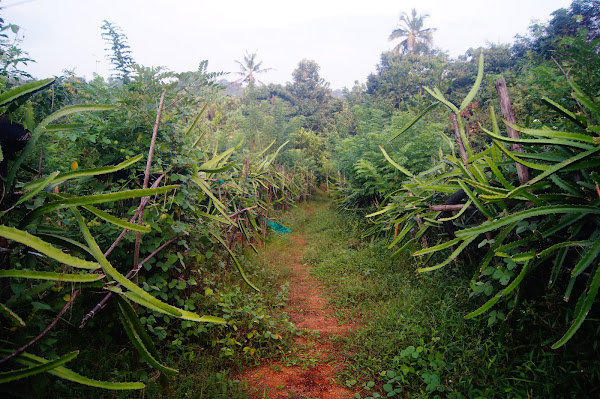Why is dragon-fruit comparatively easy growing in forest-farms?
Cultivating Dragon Fruit in Kerala's Liz Pepper Gardens: Nature's Perfect Partnership
The dragon fruit cactus (Hylocereus spp.).
With its hardy nature, adaptability, and numerous ecological benefits, cultivating dragon fruit in Kerala's Liz Pepper Gardens forest farm has become a symbiotic partnership between this exotic plant and its natural habitat.
Adaptability to Various Climates
Dragon fruit, native to Central America, has proven its adaptability to a wide range of climates, making it an ideal candidate for forest farms. Whether in the tropical rainforests, subtropical woodlands, or even temperate regions, dragon fruit plants have showcased their ability to thrive. This adaptability enables forest farmers worldwide, including those at Kerala's Liz Pepper Gardens, to integrate this unique cactus into their diverse ecosystems seamlessly.
Minimal Maintenance and Water Requirements
One of the most enticing features of dragon fruit cultivation is its low maintenance requirements. Once established, these cacti require minimal attention, making them a perfect fit for forest farms where the emphasis is on sustainable, low-intervention agriculture. Additionally, dragon fruit plants are remarkably drought-resistant, requiring significantly less water than many other fruit-bearing plants, which is a valuable trait in regions like Kerala where water conservation is crucial.
Natural Pest Resistance
In forest farms, maintaining a delicate ecological balance is essential. Dragon fruit plants possess natural resistance to many common pests and diseases, reducing the need for chemical interventions. This resistance not only promotes the health of the dragon fruit but also safeguards the overall biodiversity of the forest farm at Liz Pepper Gardens, allowing other flora and fauna to flourish undisturbed.
Supporting Biodiversity
Dragon fruit plants, with their climbing, epiphytic nature, provide unique microhabitats within forest farms. As they ascend tree trunks or structures, they create sheltered spaces where various insects, birds, and small animals find refuge. This symbiotic relationship enhances the overall biodiversity of the forest ecosystem at Liz Pepper Gardens, fostering a healthier, more resilient environment.
High Yield and Versatility
Dragon fruit plants are prolific producers, offering high yields of delectable fruits. The versatility of dragon fruit, which comes in various cultivars with white, red, or yellow flesh, enhances its appeal. At Kerala's Liz Pepper Gardens, forest farmers can diversify their produce and cater to different market demands, making dragon fruit a valuable addition to their agricultural ventures.
Soil Improvement and Erosion Control
The extensive root system of dragon fruit plants aids in soil stabilization, reducing erosion risks in forest farms. Furthermore, their organic matter-rich growth contributes to improving soil fertility, creating a more nurturing environment for other plants in the vicinity.
In Kerala's Liz Pepper Gardens forest farm, the dragon fruit plant weaves a story of resilience, adaptability, and ecological harmony. Its ease of cultivation and myriad benefits make it a cherished ally for farmers seeking sustainable agricultural practices. As it thrives amidst the towering trees and diverse flora of Kerala's Liz Pepper Gardens, the dragon fruit cactus stands as a testament to the boundless potential of nature's partnerships, reminding us that when we work in harmony with the environment, remarkable yields and flourishing ecosystems are the natural outcomes.
Also read




Comments
Post a Comment